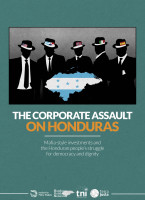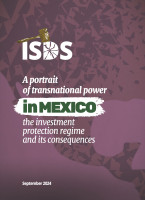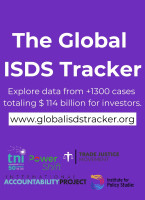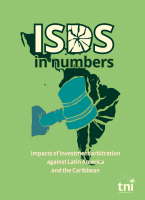ISDS in numbers Impacts of investment arbitration against Latin America and The Caribbean
Topics
Regions
Latin America and the Caribbean (LAC) is now the second most sued region in the world under investment protection treaties. In 2023 alone, 28 investor-state disputes (ISDS) were filed against LAC countries, with investors winning 60% of resolved cases. This report reveals the high social and financial costs of these disputes, challenging the promises of foreign investment treaties.
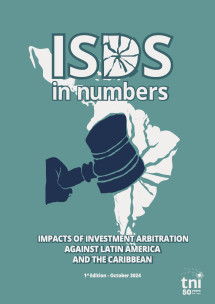
Downloads
Authors
Summary
This report presents a systematic overview of foreign investor lawsuits against countries across Latin America and the Caribbean (LAC) based on investment protection treaties up to 31 December 2023. The key findings are:
- 2023 was the year with the highest number of ISDS claims ever registered against LAC countries, with 28 claims.
- In 60% of the cases resolved, the investor won, either obtaining a favorable award or benefiting from a settlement between the parties.
- The 380 lawsuits against countries in LAC represent 28.5% of all known Investor-State disputes worldwide, making it the second most sued region worldwide.
- Argentina, Venezuela, Mexico, Peru, and Ecuador are the most sued countries in the region. Together, they were challenged by 244 lawsuits, representing almost two-thirds of all claims against LAC countries.
- 77.4% of all known claims against countries in LAC were filed at ICSID.
- 86% of the claims were initiated by investors from the US, Canada, and Europe (mainly France, the Netherlands, the United Kingdom, and Spain).
- Lawsuits linked to mining, gas, and oil account for 22.4% of total claims, more than half of which were filed during the last decade.
- Governments have been ordered to pay foreign investors $33.629 billion. This is a third more than the amount that climate catastrophes have cost the region between 1970 and 2021 and more than all the foreign direct investment received by the six Central American countries, the 15 Caribbean countries, Uruguay, Paraguay, and Ecuador combined in 2022.
- Only 30 arbitrators (top 10%) were part of 44% of the arbitration tribunals in claims against LAC countries.
During the 1990s, countries across Latin America and the Caribbean (LAC) signed hundreds of international treaties protecting foreign investment and granting investors unprecedented rights, including the right to sue states before international tribunals when they believe their profits had been affected by government actions. These countries expected that signing Bilateral Investment Protection Treaties (BITs) would be decisive in attracting foreign investment. Thirty years on, however, it is evident that BITs did not help in attracting investment, let alone in promoting development. Rather, their effects have been harmful for countries throughout the region.
The negative impacts of BITs are still largely unknown and little discussed either in political and parliamentary circles, or in civil society, academia, and social movements. This report highlights the social and financial costs of the investment protection system and international arbitration as a mechanism to resolve disputes between foreign investors and states.


